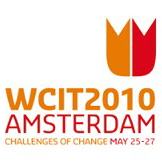
The current financial and economic crisis, coupled with rising concerns over the health of our planet, tell us that we have to act smarter, greener and faster.
ICT as an enabler will have a key role to play in improving energy efficiency, reducing greenhouse gases and increasing sustainability within the ICT sector itself, and even more importantly, in all sectors of society. ICT can enable this change through better monitoring and control, by fostering awareness and triggering new patterns of behaviour. It has the capacity, at any moment, to confront organisations and individuals with the full impact of their actions on sustainability.
International strategies to tackle climate change need to make full use of ICTs as one of the most powerful tools available that can produce the desired changes without having negative effects on prosperity or individual lifestyles. Action will need to be taken by all stakeholders.
- The ICT industry should lead by example by improving the energy efficiency of its business processes, products and services by an average of 2% per year between now and 2020, with recognition given to leaders and best practices.
- Governments should lead the way by reducing by 30% the carbon footprint of public services by 2020.
- Stakeholders from both the private and public sectors should work together to accelerate the development and deployment of smart systems. These include smart energy grids, smart mobility systems, smart buildings, smart governments, smart water systems and smart cities.
- Stakeholders, including consumer organisations, should work together to increase substantially consumers’ awareness and understanding of their energy consumption, and empower them to manage and control this use more efficiently. This could be achieved by making the energy impact of products and services more transparent through internationally comparable energy ratings.
- Governments should collaborate to agree on global standards for the transparency of energy ratings.
- Authorities should be encouraged to make energy efficiency an essential condition in their procurement policies.